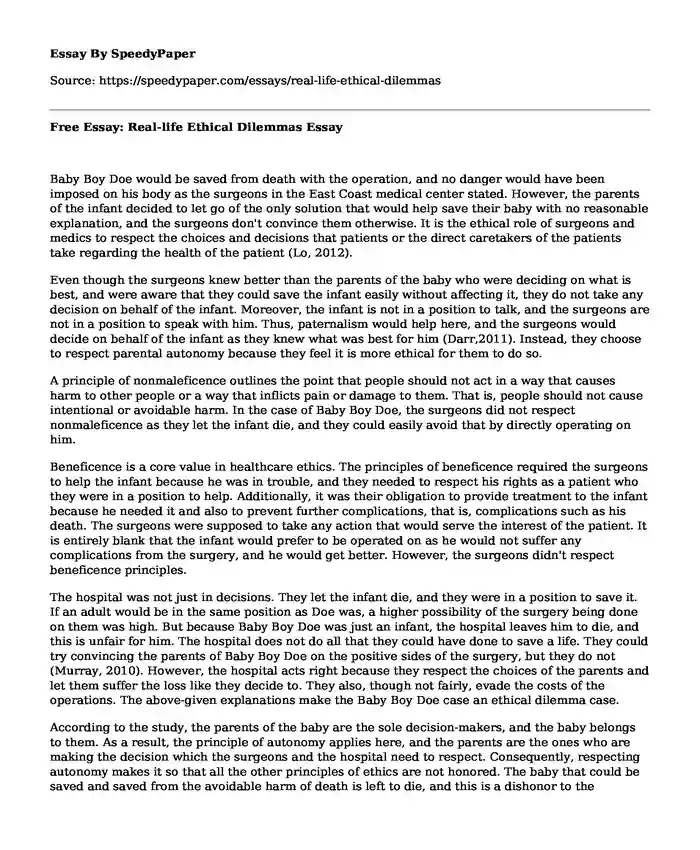
| Type of paper: | Essay |
| Categories: | Surgery Parenting Healthcare Ethical dilemma |
| Pages: | 3 |
| Wordcount: | 786 words |
Baby Boy Doe would be saved from death with the operation, and no danger would have been imposed on his body as the surgeons in the East Coast medical center stated. However, the parents of the infant decided to let go of the only solution that would help save their baby with no reasonable explanation, and the surgeons don't convince them otherwise. It is the ethical role of surgeons and medics to respect the choices and decisions that patients or the direct caretakers of the patients take regarding the health of the patient (Lo, 2012).
Even though the surgeons knew better than the parents of the baby who were deciding on what is best, and were aware that they could save the infant easily without affecting it, they do not take any decision on behalf of the infant. Moreover, the infant is not in a position to talk, and the surgeons are not in a position to speak with him. Thus, paternalism would help here, and the surgeons would decide on behalf of the infant as they knew what was best for him (Darr,2011). Instead, they choose to respect parental autonomy because they feel it is more ethical for them to do so.
A principle of nonmaleficence outlines the point that people should not act in a way that causes harm to other people or a way that inflicts pain or damage to them. That is, people should not cause intentional or avoidable harm. In the case of Baby Boy Doe, the surgeons did not respect nonmaleficence as they let the infant die, and they could easily avoid that by directly operating on him.
Beneficence is a core value in healthcare ethics. The principles of beneficence required the surgeons to help the infant because he was in trouble, and they needed to respect his rights as a patient who they were in a position to help. Additionally, it was their obligation to provide treatment to the infant because he needed it and also to prevent further complications, that is, complications such as his death. The surgeons were supposed to take any action that would serve the interest of the patient. It is entirely blank that the infant would prefer to be operated on as he would not suffer any complications from the surgery, and he would get better. However, the surgeons didn't respect beneficence principles.
The hospital was not just in decisions. They let the infant die, and they were in a position to save it. If an adult would be in the same position as Doe was, a higher possibility of the surgery being done on them was high. But because Baby Boy Doe was just an infant, the hospital leaves him to die, and this is unfair for him. The hospital does not do all that they could have done to save a life. They could try convincing the parents of Baby Boy Doe on the positive sides of the surgery, but they do not (Murray, 2010). However, the hospital acts right because they respect the choices of the parents and let them suffer the loss like they decide to. They also, though not fairly, evade the costs of the operations. The above-given explanations make the Baby Boy Doe case an ethical dilemma case.
According to the study, the parents of the baby are the sole decision-makers, and the baby belongs to them. As a result, the principle of autonomy applies here, and the parents are the ones who are making the decision which the surgeons and the hospital need to respect. Consequently, respecting autonomy makes it so that all the other principles of ethics are not honored. The baby that could be saved and saved from the avoidable harm of death is left to die, and this is a dishonor to the principle of non-maleficence. Moreover, the surgeons were more knowledgeable as compared to the parents of the baby, and as a result, they could have taken the right decision to save the baby (Darr, 2011). However, it is impossible to risk one's job at the expense of a decision that we already made. It is possible that the parents did not want a baby that was not normal, and considering that it would be a violation of rights to go ahead against their choice as they are legally allowed to deny the surgeons the green light to proceed.
References
Darr, K. (2011). Ethics in Health Services Management. (5th Edition). Baltimore, MD: Health Professions Press, Inc.
Lo, B. (2012). Resolving ethical dilemmas: a guide for clinicians. Lippincott Williams & Wilkins.
Murray, J. S. (2010). Moral courage in healthcare: Acting ethically even in the presence of risk. Online Journal of Issues in Nursing, 15(3).
Cite this page
Free Essay: Real-life Ethical Dilemmas. (2023, Jul 10). Retrieved from https://speedypaper.com/essays/real-life-ethical-dilemmas
Request Removal
If you are the original author of this essay and no longer wish to have it published on the SpeedyPaper website, please click below to request its removal:
- Essay Example on Essential Public Health Services
- Essay Example - SLP Descriptive Statistics
- Essay Example on an Explanation of the Differential Diagnosis for the Patient
- Wabash Community Health Center Case
- Essay Sample on Patient Examination
- Free Essay: Summary of the Health Care Problem
- Nurse Practitioner Roles: Training, ANA Guidelines, & Patient Care - Essay Sample
Popular categories




